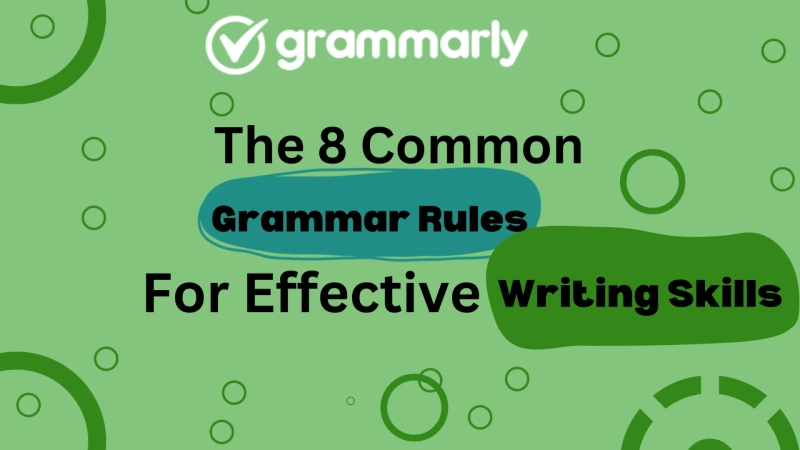Effective writing is one of the most important skills for beginners as well as professionals. Whether you have to complete an assignment, pass a test, or write an email to your higher authorities, grammar is essential. Well, you can get away with small mistakes when you are speaking. However, people will find out if you made a mistake while writing.
In this case, you can leverage CheckGrammarly to rectify the grammatical errors in your writing effortlessly. Nevertheless, making grammar mistakes while writing is a normal thing. What if you can avoid those mistakes by learning the basic grammar rules? Interesting, right? Continue reading to learn the eight common grammar rules for effective writing skills.
Essential Grammar Rules To Advance Your Writing Skills
Start learning the following essential grammar rules, and you will gradually get a robust foundation upon advancing your writing skills. Here you go!
#1 Verb Tense
Firstly, using a correct verb in a sentence will make your content more understandable and readable. The topic of tense will guarantee an article of its own. There are multiple tenses available in English grammar. If you only think about present, past, and future tense, you are wrong.
Ensure all the tenses formats and write according to the tense you are using at the moment. Also, be very careful when mixing up the tenses.
For Example:
I danced all night. (simple past tense).I danced all night. (past perfect tense).You can notice the difference between these two tenses. So, be cautious when mixing tenses in your content.
#2 Correct Adjectives And Adverbs
An adjective is a phrase or word that adjusts a pronoun or noun. Mostly, the real purpose of an adjective is to explain a noun or pronoun by expressing its characteristics. At the same time, an adverb is a word that adjusts a verb, an adjective, or even another adverb. Also, an adverb will provide information that answers a question.
For Example:
Adjective: The smart brown fox jumped over the lazy cat.Adverb: He read the book quietly.#3 Subject-Verb Agreement
Subject-verb agreement, or 'subject-verb concord,' means the sentence's subject must match the verb. The verb can be the person, number, and subject's gender. It simply needs to match the subject of the sentence.
For Example:
The cats roll in the mud. - Incorrect.The cat rolls in the mud. - Correct.#4 Capitalize Proper Nouns
A proper noun is a certain name of a place, person, organization, or thing. All the proper nouns in the sentence should be capitalized correctly. Unless it is a common noun, you don't have to capitalize them. Additionally, using the free grammar checker online, you can capitalize the proper nouns quickly.
For Example:
Correct Sentence: Today, Mary had an interview with the Managing Director, Robert.Incorrect Sentence: The Product is on Sale Now.#5 Dangling Modifiers
A dangling modifier is a phrase or a word that changes a word if it isn't clearly described in the sentence. A modifier will clarify, describe, or give more information about a concept. If the word does not modify any part of the sentence, it is called dangling.
For Example:
Dangling Sentence: Having injured his dominant leg, it was difficult to play football.Modified Sentence: Having injured his dominant leg, Ben had difficulty playing football.#6 Sentence Fragment
If a sentence is incomplete instead of a complete sentence, it is called a sentence fragment. Generally, a sentence fragment lacks a subject or base essential to make an independent clause. Not to worry, by employing the best grammar checker free tool, you can correct the fragmented sentence.
For Example:
Fragment Sentence: Gave many reasons but no logical ones.Correct Sentence: Our Manager gave many reasons but no logical ones.#7 Run-On Sentence
A run-on sentence will occur only when two independent clauses merge together without any appropriate punctuation or proper conjunctions. There are three run-on sentences you have to be aware of. They are fused sentences, comma splices, and polysyndeton.
For Example:
Run-On Sentence: Ralph cooked dinner therefore Henry will wash the dishes.Corrected Sentence: Ralph cooked dinner; therefore, Henry will wash the dishes.#8 Check Homophones
Homophones are the little things that can't be caught so easily. This is because the prefix' homo' means 'same' and the root 'phone' means 'sound.' All together, 'homophones' means 'same sound.' The suitable examples are as follows.
For Example:
Fair, fare. Incite, insight.Canon, cannon.Whole, hole.Closing Part
These are eight standard grammar rules that are necessary for effective writing. Now that you know all these grammar rules and examples, you can take your effective writing skills to the next level. Along with these rules, it would be better if you start reading more. By doing this, you will learn new grammar structures and vocabulary daily. Finally, keep in mind that practice is equally important when it comes to effective writing. So, write more often!


